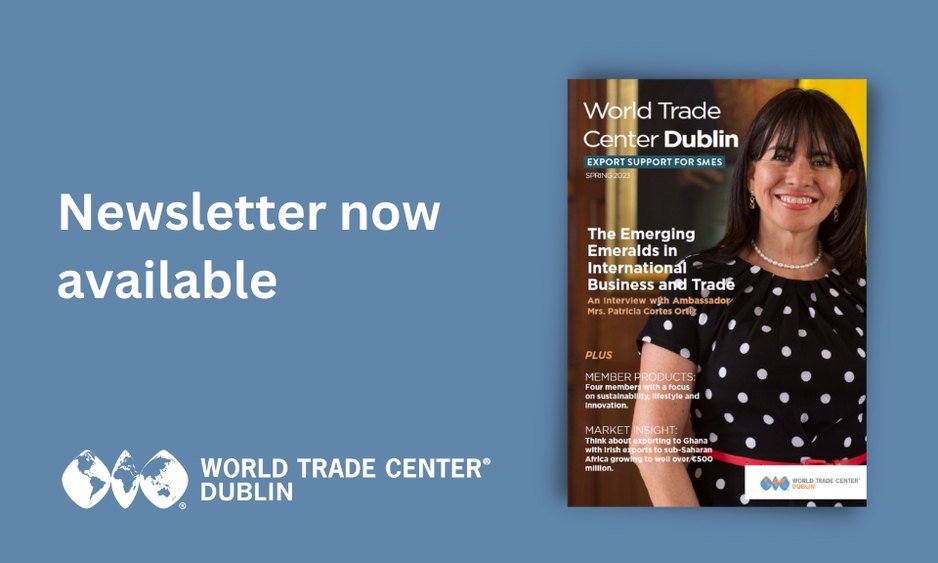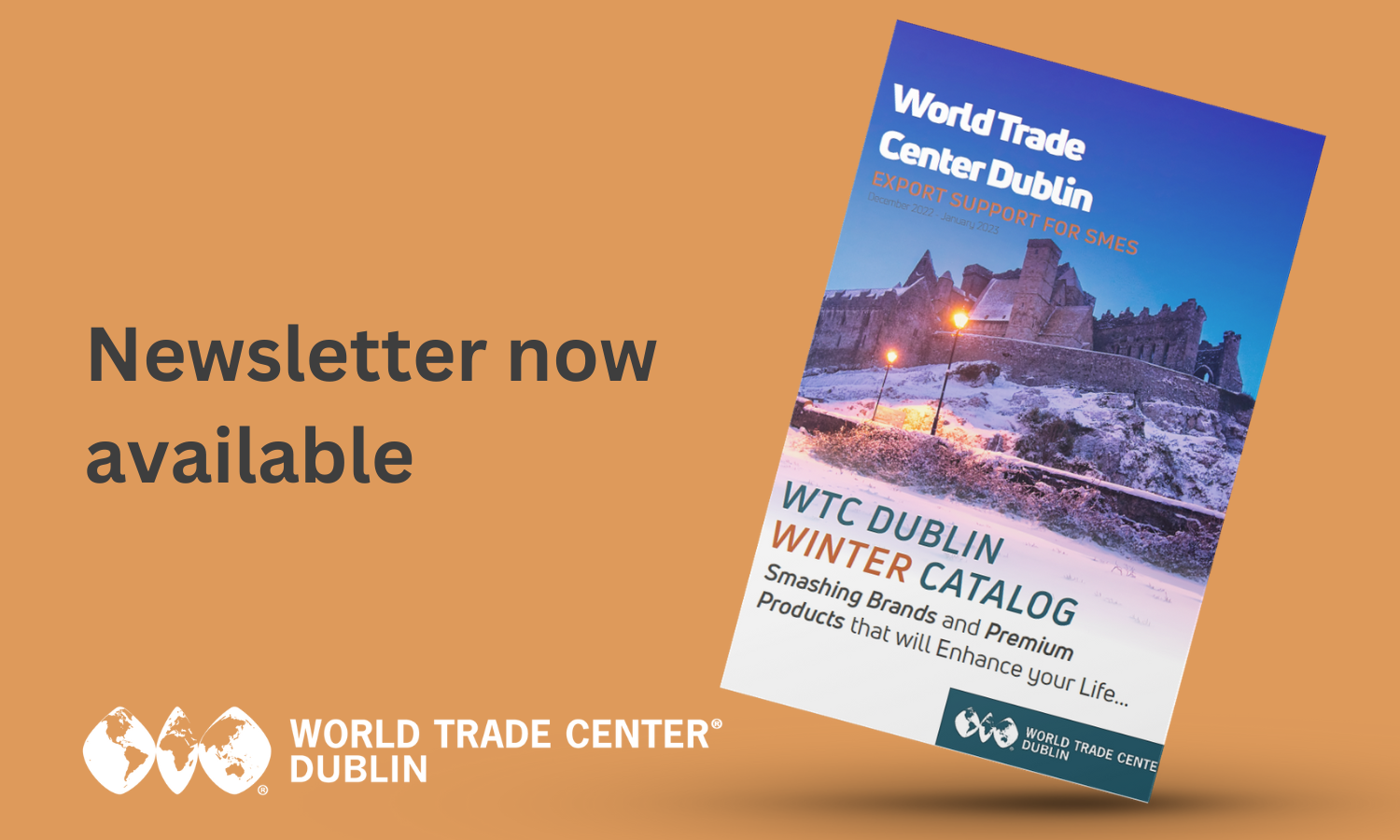A SIT DOWN WITH AMBASSADOR MULHALL

Since we last spoke, the United Kingdom left the European Union – on 31 December 2020. The EU-UK Trade and Cooperation Agreement (TCA) was agreed at the 11th hour and has assured tariff-free trade in goods. This was particularly important for businesses in Ireland given the significant trading relationship we enjoy with Britain. As has been widely reported, the Northern Ireland protocol, also agreed between the EU and the UK in December 2020, continues to be a subject of discussion between the two sides as there are differences about its implementation. The Protocol, which was jointly negotiated by the current UK Government and the EU, is jointly owned by them. It needs to be properly implemented by both sides. There can be no room for unilateral actions or renegotiation of the Protocol. From the perspective of the Irish Government, we will do all we can to ensure that solutions are found to support continuing economic advancement in Northern Ireland, to which the Protocol, by giving Northern Ireland full access to the EU and UK markets, has the potential to facilitate.The last time I had the honor of interviewing you, we were talking about Brexit and the impact it would have on Ireland. Can you give us a brief Brexit update?
Has the relationship between the Republic and Northern Ireland changed as a result?
The Irish Government is investing heavily in its relationship with Northern Ireland. In particular, our Government’s program sets out commitments on a Shared Island Initiative. This includes efforts to work with all communities and traditions on the island of Ireland to build consensus around a shared future, underpinned by the Good Friday Agreement. The initiative includes a €500 million Shared Ireland fund, which provides for significant new, multiannual capital funding for investment on a strategic basis in collaborative North/South projects.
From a trade perspective, you may have seen the interesting statistics published recently. Our imports from Northern Ireland have increased 77% while our exports to the North have risen 43% since the UK’s exit from the EU. The reasons for this are complex and the situation is still evolving. It is far too early to draw precise conclusions from it. Stockpiling pre-Brexit, COVID and other factors have no doubt contributed to the new trading dynamic. The significant increase in trade does however point to new supply chains emerging as businesses seek alternative sources of supply.
What will be the long-term impact on the economy?
I will leave predictions of the long-term impact to the economists, but I would like to point out two things. First, Ireland has been diversifying its links with other trading partners, making use of the many free trade agreements that the EU has with third countries. The Irish Government’s Global Ireland initiative is ensuring that we have an Irish presence on the ground in an increasing number of countries, which is designed to provide Irish businesses with new international opportunities. This is having a marked impact with dependence on the UK market decreasing and trade increasing with other key partners like the United States and other EU Member States.
Second, I would like to highlight the unique economic opportunity that Northern Ireland now has under the arrangements agreed between the EU and the UK last year. It is the only place that has free access to the prosperous UK and EU single markets. Indeed, Invest NI commented recently on the increased interest from companies seeking to locate projects in Northern Ireland since Brexit. The United Kingdom will remain an important trading partner for Ireland and there is early evidence of increased trade between North and South in Ireland. More investment into Northern Ireland and North-South trade can only be good for both economies and societies.
Most recently we have had to face the challenges of the Global Pandemic. How has this impacted Ireland?
Like other nations across the world, Ireland has been significantly impacted by the COVID pandemic. The Irish Government took early and decisive action and prioritized the health of our citizens by implementing strict protocols to slow the spread of the disease. Significant fiscal supports were introduced to support businesses and to keep as many people in employment as possible. The strength of the Government’s fiscal position and strong economic performance before the pandemic struck has enabled the Government to take an active role in supporting the economy.
Our economy also performed remarkably well during 2020, and was one of the few countries that actually recorded economic growth. This was powered by our strong export performance, in the ICT and life sciences sectors in particular. Ireland worked to ensure that supply chains of essential products were kept open. This was done by designating essential services and maintaining of critical transport routes. As a result, the OECD recognized Ireland as the fifth largest exporter of COVID-related goods in 2020. Our research community also participated strongly in the fight against COVID, with Irish researchers playing critical roles at the WHO and in developing the Astra Zeneca vaccine. Indeed, Irish companies were integral to transatlantic initiatives from developing therapeutics and testing to contact tracing and software used to verify safe travel. Companies like Icon, Nearform and Verifly were shining lights during a very difficult time.
While the pandemic is far from over, Ireland has managed the vaccination of its population well, with 90% of our adult population now fully vaccinated.
When do you think business will start hiring again?
While Ireland has performed strongly, the economic impact has been very challenging for some sectors. As the public health situation improves further and the economy is further re-opened, we will begin to see the rate of unemployment reduce further. Most of the Irish economy will be reopened during September, including the entertainment sector and this will have a significant impact on hiring and increased job opportunities. It is also vital that international travel returns. Ireland welcomed over 11 million tourists in 2019 contributing over 1 billion euro to the economy.
What do you anticipate will happen after wage subsidies are no longer available?
The Irish Government intervened strongly to protect employment and extended these supports to ensure that people and businesses were protected from the worst impacts of the pandemic. As more people are vaccinated and health restrictions are further eased and the economy fully reopens, it is hoped that the business outlook and employment opportunities will improve without the need for the same level of subsidies.
When will tourism and business travel be back to pre-pandemic rates?
In 2019, Ireland saw record levels of passenger numbers, including 2 million visitors from North America. While it is impossible to predict when travel will return to pre-pandemic rates, Ireland has proved itself as an international hub for travel. Preclearance of travel into the United States is an important aspect of that. Unfortunately, travel restrictions still apply for many countries (including Ireland) entering the United States which is impacting on travel severely. It is difficult to see why Irish visitors cannot be allowed to enter the US given the very high levels of vaccination in Ireland. I am hopeful that EU-US engagements on this matter, that were established earlier this summer, will find a way to lift these restrictions soon. Ireland remains open, and welcomes vaccinated visitors from most countries including the USA with no quarantine requirements.
Ireland has truly become the gateway to Europe. What impact is that having?
Ireland is a gateway to Europe and continues to attract significant volumes of Foreign Direct Investment. We continue to provide companies with the unique benefits of a dynamic, innovative and competitive business environment which is underpinned by a diverse, young, highly talented, educated and English speaking workforce. Ireland has pursued a strategy of an open knowledge economy for many years now and the impact of this has been significant. While we continue to attract and retain multinational companies, their activities have evolved as the economy has moved into advanced manufacturing, emerging and future technologies, cutting edge life sciences and advanced business and customer services. Ireland’s evolution towards becoming a global innovation leader is connecting world class researchers and research centers with cutting edge companies, in what is becoming a highly innovative business environment. As well as the advancement of our economy, we have also seen our society changing to become one of the most open and inclusive societies in the world. We were the first country to legalize marriage equality by popular vote and we now have one of the most diverse populations in the EU.
Has this impacted the cost of living?
As a country becomes more successful, it must manage its competitiveness to ensure a good standard of living. This is doubly important for a country like Ireland that is so open to international trade and investment. Attracting investment is not just about the business environment but also about infrastructure, safety, education and ensuring Ireland is a place that people want to live and can afford to live in. Ireland was recently ranked by the OECD as the best place in terms of overall life satisfaction.
How is the labour market in Ireland looking?
Ireland had the fastest growing economy in Europe before COVID and was one of the only countries in the world to record economic growth in 2020. Current forecasts project strong economic growth in 2021 and 2022, at 7.2% and 5.1% respectively (according to the EU Commission). This bodes well for the recovery of the labour market, which was severely impacted during the pandemic. Our third-level attainment rate among 25–34-year-olds is significantly above the EU average (58.4% vs 40.5%) and Ireland has the highest level of STEM graduates per capita in the EU (among 20–29-year-olds).
Ireland is also developing sophisticated approaches to research, third level education, remote working and regional development to ensure we are well positioned to attract and retain the brightest talent for the future of work.
Is there any update on the Corporate Tax Rate for companies locating in Ireland?
Ireland has maintained a transparent and consistent position in respect of our corporate tax rate for many years. There is a process at the OECD to develop a new framework for international corporate taxation. Ireland has been part of this process and has implemented recommendations arising from the first stage of the process (BEPS 1). Our Department of Finance publishes the details of these and other corporate tax reforms in the Corporate Tax Roadmap, which was updated earlier this year. Ireland remains committed to the OECD process and to achieving a comprehensive, sustainable and equitable agreement (BEPS 2) that meet the needs of all countries, large and small, developed and developing.
You have been serving in Washington D.C. for a few years now. How would you compare the business climate between DC and Dublin?
DC and Dublin have some similarities. They are both capital cities and have lots of beautiful green spaces and historic buildings and monuments. From a business perspective we both enjoy a vibrant tourist industry and excellent restaurants and entertainment venues. We differ also though, with many companies headquartered in Dublin, particularly the ICT and Financial Services sectors, whereas DC tends to house the Government and Regulatory Affairs offices of its major companies. Both cities share a similar desire though to become centers of investment and commerce. In this regard, my Embassy was delighted to be involved in the first virtual trade mission between the Mayor’s Office of Planning and Economic Development and the DC Chamber of Commerce, and the Dublin Chamber of Commerce and many of our State Agencies, earlier this year. The Mayor’s Office has a plan to make DC a hub for international business and we very much share this ambition for our capital city and country.
You have a devoted following on social media that shares your passion for poetry. How were you introduced to poetry and please share a favorite poem if you would.
I am an admirer of the work of W.B. Yeats and am the Honorary President of the Yeats Society. As an Irish historian, I have a special interest in the manner in which Yeats’s poetry brilliantly sheds light on key moments in Ireland’s past. His poem, Easter 1916, is a favorite of mine. It deals with the Easter Rising of 1916, which inspired Ireland’s independence. A shorter Yeats poem that I like to recite is ‘The Lake Isle of Innisfree’. ‘I will arise and go now, and go to Innisfree.’

JOIN THE WORLD TRADE CENTER DUBLIN
to start benefiting from the opportunities that we can provide for you and your business. Gain access to a network that includes 330 World Trade Centers in over 100 countries that can support your international trade journey today!
€495.00 + VAT
OUR NEWSLETTERS
Spring 2023
In this issue: Member Products Interview with the Colombian Ambassador to Ireland Market Insight: Africa World Trade Centers Association General Assembly Upcoming International Events
December 2022 Newsletter
Welcome to your December Newsletter In this issue: A message from WTC Dublin President Maureen Pace Partnership announcement between FoodCloud and WTC Dublin A jam packed Winter Catalog with Irish premium products Listings of Tradeshows and Events taking place around...
AUGUST 2022 NEWSLETTER
Summer Santa Catalogue. A sit down with Bronagh Conlon.
























